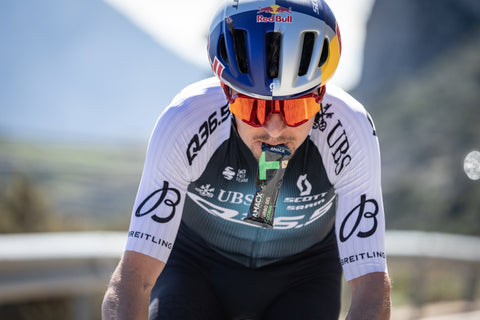Are you preparing for a half marathon? It's great that you also think about the correct preparation of your nutrition plan! This can be an important link in completing this distance, or improving your personal record. How much exactly should you eat before the competition? And is it necessary to drink something along the way? In this blog you can read what you need to eat and drink to make your half marathon a great success.
Carb stacking
In terms of nutrition, the final preparation for your half marathon starts about 36 to 48 hours prior to the start. The day before the marathon should be devoted to stacking carbohydrates ('carbo loading'). This ensures that the glycogen stores in your muscles, which serve as a fuel tank for the necessary carbohydrates, are fully filled. What and how much exactly you need to eat to stack carbohydrates correctly depends on, among other things, your body weight.
The evening before the marathon, check off the carbohydrate stacking. At that moment you know that the fuel tank in your muscles is full and that it will not be emptied during the night before you start. This means that on the morning of the race you only have to replenish the (significantly smaller) glycogen stores in your liver. The body continuously draws energy from this fuel tank (including to supply the brain with fuel), so it is partially empty in the morning after waking up. For this reason, it is advisable to have a carbohydrate-rich breakfast (or lunch, if the start is late) in order to get the last fuel in the body's stores.
The last 3 hours before the half marathon
Aim for an amount of +- 2-3 grams of carbohydrates per kilogram of body weight. For someone weighing 70kg, this amounts to +- 140 to 210 grams of carbohydrates. To ensure that this is all digested and absorbed before the start of your race, and thus prevent stomach/intestinal complaints, it is recommended to eat about 3 hours before the start. In addition, make sure that the meal is easy to digest, especially if you know that you have a sensitive stomach when walking. Choose low-fiber products (such as white bread, corn flakes or rice porridge) and, if necessary, fill with liquid sugars (such as honey, jam and fruit juice). Avoid products that contain a lot of fats and/or proteins, such as eggs, (full-fat) dairy, cheese and meat products. In addition, do not forget to drink plenty of fluids. Aim for at least 500ml of fluid, but above all check the color of your urine. This should be relatively light in color to ensure that your fluid balance is in order. See an example below:
70 kg runner (goal = +- 140-210 grams of carbohydrates) |
|
3 white balls with jam, syrup or fruit sprinkles |
100 grams of carbohydrates |
Bowl of fruit yoghurt (200g) |
25 grams of carbohydrates |
20 grams of cornflakes |
20 grams of carbohydrates |
1 glass of fruit juice (200ml) |
25 grams of carbohydrates |
Total |
170 grams of carbohydrates |
Take enough rest after your breakfast to properly process and absorb all the nutrients. This is crucial to avoid gastrointestinal upset during the marathon, and requires at least 2-3 hours depending on the specific breakfast. If you want to eat something small in the run-up to the start, choose a light, carbohydrate-rich snack. This can be a ripe banana, but also an energy bar such as the Amacx Fast Bar or Energy Nougat. Don't forget to drink enough in the last hours before the start.

Principles for a successful Half Marathon
As soon as the starting gun has sounded, your competition nutrition plan comes into effect. The most important principles here are:
-
First and foremost, make sure you have a competition nutrition plan. Eat and drink at the planned times, even if you feel better than expected or if you are not hungry or thirsty. Try to stick to this plan, but don't forget to make minor adjustments if necessary (for example if it gets warmer than planned, or if you unexpectedly suffer from stomach or intestinal complaints). Train this competition nutrition plan regularly to train your stomach and intestines to process these nutrients during exercise!
-
Carbohydrates and fluid are central to any competition nutrition plan. Put these two nutrients at the heart of the competition nutrition plan, and set clear and achievable hourly target intakes for both (see below).
-
Be well prepared and avoid any surprises. So make sure you have access to the products you have trained with and that you know you tolerate well. Know where the organization's supplies are and what is provided here. If you need other products or products at other times, please arrange this yourself.
Avoid exhaustion and keep your energy up
Although not eating/drinking during the half marathon is still quite common, it is certainly not recommended for strenuous efforts of 75 minutes or longer. Therefore, aim for a carbohydrate intake of at least 30 to 60 grams of carbohydrates per hour during the half marathon to ensure that the fuel tank in your muscles does not become depleted. Once these glycogen stores are depleted, you will experience the well-known 'hunger pangs'. Therefore, try to take an Amacx product from the Energy Line regularly, 1 to 2 times per hour. The most obvious option is to take an Amacx Drink Gel once every 30 to 60 minutes. These gels are very easy to digest, provide energy very quickly and can be consumed without additional water. However, if you prefer one of the bars from the Energy Line, or Energy Drink, this can of course also provide the necessary fuel.
Make sure you drink enough
In addition to energy (carbohydrates), your body also needs sufficient fluid. At a relatively low temperature and limited individual sweat losses, you may not or hardly need to drink during a half marathon. However, if it is very warm and/or you naturally sweat considerably, it becomes important to compensate for some of the sweat losses while walking. By continuing to drink enough you will prevent significant loss of performance in the last part of your marathon. The starting point during the competition should always be to lose a maximum of 2 to 3% of your body weight through sweating. Someone weighing 70kg will therefore be able to lose a maximum of about 2.1kg during their half marathon before serious performance loss occurs.
Therefore, try to measure your sweat loss in advance during the heavier training sessions in the following way:
- Weigh yourself shortly before the start of training, without clothes and preferably after going to the toilet.
- Do your training as always. During training, write down exactly how much you eat and drink. Also record the temperature and humidity.
- Immediately after training, dry the sweat from your body, go to the toilet again and weigh yourself again.
Normally you will lose weight during a tough workout. For example: an athlete weighs 70kg before training, he drinks nothing during the 1-hour training and still weighs 68.8kg afterwards. His sweat loss under these conditions is 1.2 liters per hour. If the expected finish time of this runner is around 1.5 hours, he will lose a total of +- 1.8 liters of sweat (= 2.5% of his body weight). This would make it sufficient not to drink during a half marathon, without this being at the expense of performance. However, if the expected finish time is around 2 hours, the total sweat loss will be 2.4 liters (= 3.4% of body weight) and it is strongly recommended to drink at least 500ml during the half marathon.

Optimize your preparation and performance
Don't forget that a balanced diet, tailored to your training schedule, also offers great added value earlier in the preparation. This will allow you to make more progress with each training and ultimately arrive at the start of the race in even better shape. Don't forget to train your competition nutrition plan during some longer/heavier training sessions in the run-up to the half marathon. This is necessary to train your stomach and intestines to absorb and process the required nutrients during exercise, without resulting in stomach or intestinal complaints. Caffeine can also certainly provide an extra boost during the match. For example, choose the Amacx Caffeine tablets.
In summary:
-
Start loading carbohydrates ('carbo loading') 24 to 36 hours prior to the half marathon. The starting point is approximately 10 grams of carbohydrates per kilogram of body weight per day. This ensures maximum muscle glycogen stores.
-
Provide a carbohydrate-rich and easily digestible breakfast about 2 to 3 hours before the start. The starting point is approximately 2 to 3 grams of carbohydrates per kilogram of body weight. This meal ensures a maximally filled liver glycogen store.
-
If necessary, have a small carbohydrate-rich snack 1 hour before the start, such as a ripe banana or energy bar from the Amacx Energy Line.
-
Don't forget to drink enough during the last hours leading up to the start. Check the color of your urine: if it is light in color, you know that your fluid balance is in order.
-
During the marathon, aim for 1 to 2 products from the Amacx Energy Line per hour, to achieve an intake of 30 to 60 grams of carbohydrates per hour. Gels are the most obvious choice.
-
Determine your individual sweat loss in the run-up to the marathon and adjust your fluid intake during the marathon accordingly. The basic principle here is to lose a maximum of 2 to 3% of body weight during the competition.













